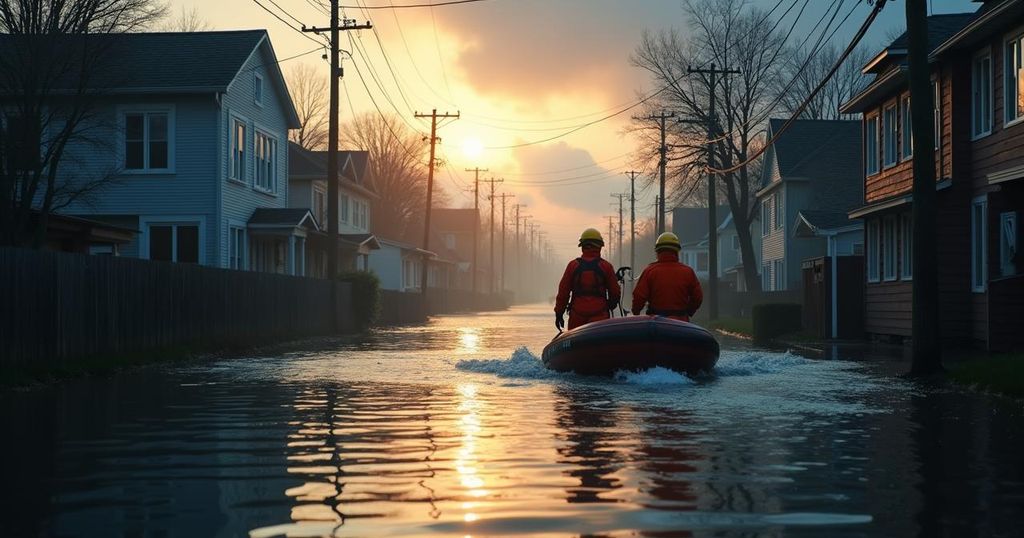Hurricane Helene: A Catastrophic Storm Leaves a Trail of Destruction and Heartbreak

Hurricane Helene has left over 190 people dead and caused widespread devastation across six states, leading to extensive search and rescue operations, particularly in North Carolina. President Biden has promised federal resources to assist recovery efforts, while numerous tales of loss and survival come to light. Helene is now recognized as the second-deadliest hurricane to strike the U.S. mainland in 55 years, following Hurricane Katrina.
Search and rescue teams are urgently working to locate and save survivors of Hurricane Helene, which devastated the U.S. Gulf Coast one week ago. The storm has tragically resulted in over 190 fatalities across six states, including Florida, Georgia, South Carolina, North Carolina, Virginia, and Tennessee. In response to this crisis, President Joe Biden has pledged federal support, directing the Department of Defense to deploy 1,000 active-duty personnel to aid in delivering essential supplies to affected areas. During a visit to North Carolina, President Biden remarked, “I don’t have to tell this group that Hurricane Helene has been a storm of historic proportions. The damage is still being assessed, but many people are still unaccounted for. So, I’m here to say, the United States – the nation – has your back.” Search and rescue operations are particularly acute in western North Carolina, where catastrophic flooding has rendered major roadways and bridges unusable, thus isolating several communities. As rescuers gain access to previously unreachable areas, the grim toll is expected to rise. North Carolina has reported the highest number of deaths, particularly in Buncombe County, where rampant flooding devastated the Asheville area. Residents are sharing heartbreaking accounts of loss, with one mother recounting the tragic drowning of her 7-year-old son, along with her own parents in the flood. Substantial destruction was inflicted when Hurricane Helene made landfall in Florida as a Category 4 hurricane, bringing with it winds of 155 mph. Following its initial impact, the storm weakened as it traversed through Georgia, Tennessee, and the Carolinas, causing significant rainfall and subsequent flooding that has resulted in further casualties. In total, at least 25 lives were lost in Georgia alone, and multiple rescues have been conducted, including dramatic cases where individuals were saved from floodwaters by first responders and civilians alike. The Tennessee Department of Environment and Conservation has issued a temporary advisory against water contact due to contamination risks following the storm’s assault, indicating compromised wastewater treatment facilities and potential sewage overflow into local waters. In terms of historical context, Hurricane Helene is now recorded as the second-deadliest hurricane to strike the U.S. mainland in over half a century, surpassed only by Hurricane Katrina in 2005, and the most destructive since Hurricane Camille in 1969. This storm has exceeded the devastation seen during North Carolina’s ‘Great Flood of 1916.’
Hurricane Helene has left an unprecedented path of destruction across the Southeastern United States, making landfall as a major hurricane and transitioning into a tropical storm with continued lethal impacts. The aftermath has prompted extensive search and rescue efforts, as many areas remain cut off due to flooding. Emergency management is heavily involved, with federal, state, and local responders coordinating to provide essential assistance. The human stories emerging from the disaster highlight the profound personal losses and the resilience of communities coming together in the face of adversity. This situation is exacerbated by potential health risks associated with flooding, including contamination of water sources and sanitation concerns. Helene’s impact has been documented by various media outlets and governmental agencies, emphasizing the scale of the disaster and the ongoing efforts to recover and rebuild.
In conclusion, Hurricane Helene’s catastrophic impact has resulted in significant loss of life and extensive damage across multiple states. With over 190 fatalities reported and many communities still grappling with the aftermath, search and rescue operations are crucial in locating survivors and providing aid. The federal response, including the deployment of military resources, underscores the severity of this disaster. Moving forward, the focus will remain on recovery, rebuilding, and addressing the public health risks arising from the flooding.
Original Source: nypost.com








